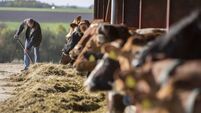Derogation granted for burning of agricultural green waste

An exemption under the legislation, which has allowed farmers to dispose of waste generated by agricultural practices by burning as a last resort following strict application of the waste hierarchy, has been extended on several occasions.
Regulations have been signed to provide for an extension to the exemption allowing for the onsite burning of agricultural green waste in certain limited circumstances.
The Waste Management (Prohibition of Waste Disposal by Burning) Regulations were drafted by the Department of the Environment, Climate and Communications following consultation with the Department of Agriculture, Food and the Marine.











